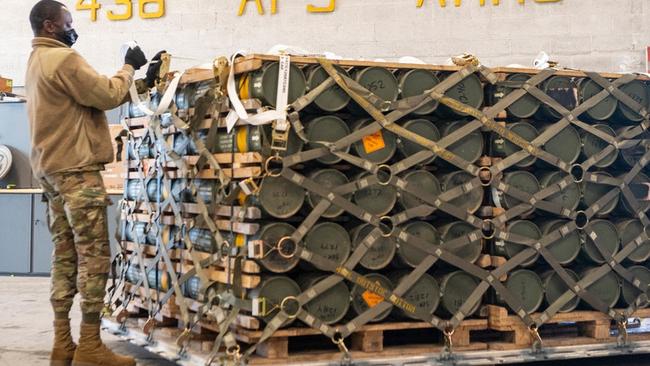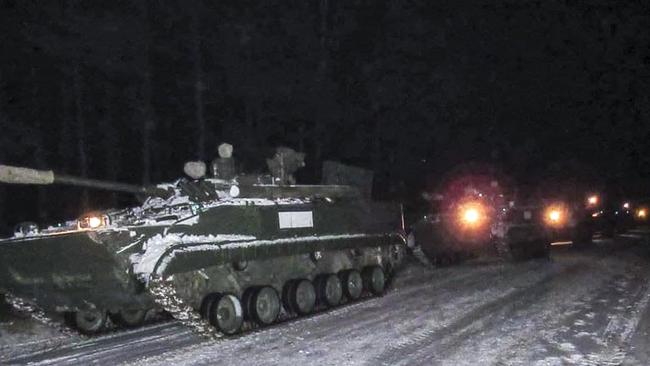Russia-Ukraine conflict: Why the West must act
The world is waiting anxiously to see if Russia invades Ukraine, which could have huge consequences. Here’s what you need to know.
World
Don't miss out on the headlines from World. Followed categories will be added to My News.
Ukraine and Russia have been in a faux war since the start of 2014 when in the Ukraine capital Kyiv, locals took to the streets after their Moscow-aligned president Viktor Yanukovych refused to sign a trade agreement that would have aligned his country closer to the European Union. The popular uprising and protest saw 130 mostly civilians killed and the president forced to flee to Russia. The Ukraine parliament dissolved his presidency and ordered a new election. But Russian President Vladimir Putin declared the action of its neighbour a coup and vowed to take back parts of Ukraine, notably the profitable industrial zone of the country’s east, as well as the strategic Crimea peninsula.
Ukraine and Russia have been in a faux war since the start of 2014 when in the Ukraine capital Kyiv, locals took to the streets after their Moscow-aligned president Viktor Yanukovych refused to sign a trade agreement that would have aligned his country closer to the European Union. The popular uprising and protest saw 130 mostly civilians killed and the president forced to flee to Russia. The Ukraine parliament dissolved his presidency and ordered a new election. But Russian President Vladimir Putin declared the action of its neighbour a coup and vowed to take back parts of Ukraine, notably the profitable industrial zone of the country’s east, as well as the strategic Crimea peninsula.
But wasn’t Ukraine once part of Russia?
Following the collapse of the USSR in 1991, Ukraine ceased to be a republic of the Soviet Union and in December that year voted by an overwhelming 92 per cent to become an independent country. From the formal USSR dissolution, other republic states also became independent, including Armenia, Uzbekistan and Kazakhstan, and relations with Moscow remained harmonious. This changed in 2014 when Putin lamented the end of the USSR and following the crisis in Kyiv, deployed troops to Ukraine’s Crimea region to recapture and annex the peninsula, which they did in about one month. Moscow then set its sights on other Ukraine regions, including the Donbas where since 2014 Russian troops have backed local militia in a war against government troops which has so far claimed 14,000, mostly civilian, lives.
Did Australia voice concern of the evolving crisis in 2014?
Yes, technically, when on July 17 Malaysian Airlines flight MH17 from Amsterdam to Kuala Lumpur was shot down by pro-Russian rebels as it flew over the Donbas region. The downing of the aircraft killed all 298 people on board, including 38 Australian citizens and residents. An exhaustive multinational investigation, in which Australia had a leading hand, as well as a long-running court case in The Hague, concluded the commercial passenger plane was accidentally shot down by a missile system from Russia’s 53rd Anti-Aircraft Missile Brigade.
Three Russian military chiefs and one Ukrainian rebel were charged in absentia. Russia denied any culpability and for a time even claimed its troops had never been in the Donbas. Australia has since formally protested to Moscow over the downing and as late as last week called on Russia to remove its troops from the Ukraine border, with Prime Minister Scott Morrison pledging Australia would work with the US and UK in deterring war and “whatever action” they considered taking in support of Ukraine. Australia has formally offered tech support to Ukraine to combat cyber attacks, suspected to have come from Russia and Belarus. DFAT formally urged the 1400 Australians living in Ukraine to leave or be prepared to shelter as war was imminent.

Why has this war dragged in other nations?
Putin and the Kremlin’s primary concern has been that the shift by Ukraine to become more aligned to the EU would see it gain NATO membership, joining an intergovernmental military alliance between 27 European nations and the United States. In Putin’s eyes, that would place a huge adversary along Russia’s western border. He began amassing troops on the border as it appeared NATO would accept Ukraine, even though it has avoided the anticipated antagonistic shift for the past decade. Russia moved 100,000 troops to the border, ostensibly for training, as it warned Ukraine to stay away from NATO. Putin has long claimed NATO was a Cold War relic that remained a threat to Russia.
What was the response?
The United States has consistently warned it would impose sanctions on Russia if it invaded Ukraine. Britain and the EU also backed such a move. President Joe Biden said the “heavy price” he would exact on Russia could include cutting it off from the US-dominated global banking system, which could effectively collapse the country. The US initially said it would not enter a prospective war but dispatched more than 200 troops to help train Ukraine soldiers as well as providing US$200 million ($A280 million) in “military aid”. On January 24, the Pentagon announced it had ordered 8500 troops on higher alert to potentially deploy to Europe as part of a NATO “response force”. European nations also warned their citizens in Ukraine of an impending war and also raised concerns directly with the Kremlin.

What could the toll be?
Immeasurable for all sides and both military and civilian, the likes of which Europe has not seen since World War II. Belarus has spoken out in support of Russia and could join any military action but given the huge military might of Russia forces, they may not need it, even if NATO troops dispatch a powerful force. Ukrainians could be killed, starved out or even freeze in a winter. Throughout the Cold War, Russia continued to pipe gas to Europe but Putin could easily switch the taps off. Even if he didn’t, Biden indirectly could, by cutting Moscow off from its ability to trade in foreign currency. Ukraine has nearly 255,000 active military personnel and 900,000 reservist, s while Russia has one of the largest militaries in the world, with one million full-time troops and two million reserves.




